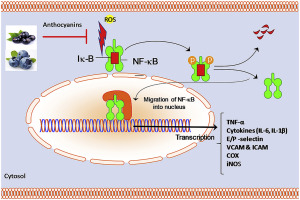Free Radical Biology and Medicine ( IF 7.4 ) Pub Date : 2020-02-13 , DOI: 10.1016/j.freeradbiomed.2020.02.004 Anahita Aboonabi 1 , Arta Aboonabi 2

|
Anthocyanins exhibit antioxidant and anti-inflammatory activities via a multitude of biochemical mechanisms. However, the signaling pathways involved in the actions of anthocyanins against chronic inflammation are not fully understood.
The effects of berry-rich anthocyanin supplements (320 mg/day) for four weeks were examined on features of metabolic syndrome components and the expression of PPAR-γ, Nrf2, and NF-κB dependent genes in MetS and healthy subjects. Total RNA was isolated from whole blood with the PAXgene proprietary blood collection system.
Four weeks anthocyanin consumption significantly decreased fasting blood glucose (15.7% vs 3.2%), TG (18.2% vs -1.39%), cholesterol (33.5% vs 1.56%) and LDL (28.4% vs -15.6%) in the MetS compared to Control group (P-value < 0.05, 95% CI). There was a significant up regulation in the expression PPAR-γ gene associated with the lipid and glucose metabolism in MetS subjects which negatively correlated (P-value < 0.01) with the change in the FBG (r = -0.488), Cholesterol (r = -0.496), TG (r = -0.513) and LDL (r = -0.519). Moreover, anthocyanin supplementation decreases serum hs-CRP (-36.3% vs 6.25%) in MetS in compared to Control group (P-value < 0.05). Anthocyanin supplementation also down-regulated the expression of NF-κB dependent genes including TNF-α (-28% and -15%), IL-6 (-16.1% and -13.6%), IL-1A (-21.5% and -12.9%), PCAM-1 (-15% and -17.5%), and COX-2(-26% and -27%) in both MetS and Control group respectively (P-value < 0.05).
The study results suggested that berry supplements improved selected features of metabolic syndrome and related cardiovascular risk factors. These benefits may be due to the inhibition of NF-κB dependent gene expression and enhancement of PPAR-γ.
中文翻译:

花青素减少炎症并改善葡萄糖和脂质代谢,与代谢综合征患者抑制核因子-κB活化和增加PPAR-γ基因表达有关。
花色苷通过多种生化机制表现出抗氧化和抗炎活性。但是,花色苷抗慢性炎症作用的信号通路尚不完全清楚。
在MetS和健康受试者中,检查了富含浆果的花色苷补充剂(320 mg /天)连续4周的代谢综合征成分特征以及PPAR-γ,Nrf2和NF-κB依赖基因的表达。使用PAXgene专有血液采集系统从全血中分离出总RNA。
与MetS相比,服用四周的花青素可显着降低空腹血糖(15.7%vs 3.2%),TG(18.2%vs -1.39%),胆固醇(33.5%vs 1.56%)和LDL(28.4%vs -15.6%)。对照组(P值<0.05,95%CI)。MetS受试者中与脂质和葡萄糖代谢相关的PPAR-γ基因表达显着上调,与FBG(r = -0.488),胆固醇(r = -0.496),TG(r = -0.513)和LDL(r = -0.519)。此外,与对照组相比,补充花色苷可降低MetS中的血清hs-CRP(-36.3%对6.25%)(P值<0.05)。花青素的补充还下调了NF-κB依赖性基因的表达,包括TNF-α(-28%和-15%),IL-6(-16.1%和-13.6%),IL-1A(-21.5%和- 12.9%),
研究结果表明,浆果补品改善了代谢综合征和相关心血管危险因素的某些特征。这些好处可能是由于抑制了NF-κB依赖性基因表达并增强了PPAR-γ。



























 京公网安备 11010802027423号
京公网安备 11010802027423号